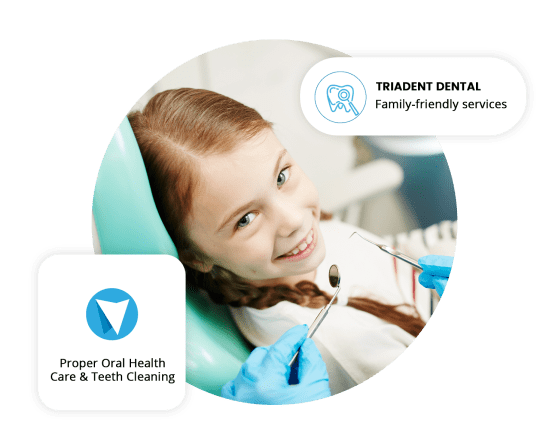

Bell's Corner Dentist
Ottawa DentistBell's Corner Dentist, located in Ottawa, Triadent Dental is a “one-stop-shop” for all of your Bells Corners, Ottawa dental needs. With state of the art technology on-site, we are proud to offer our patients a comprehensive approach to their Bells Corners Ottawa family dentistry needs, including denture fabrication and dental implant treatments. We offer a variety of family-friendly services, including general dental cleaning and check-ups, dental implants & prosthetics, denture fabrication, root canal treatment, and more, with appointments available off-hours.
Schedule an appointmentBell's Corner Dentist
Bell's Corner Dentist in OttawaOur complete dentists services

General Cleaning & Hygiene
Regular check-ups and cleanings for maintaining general dental hygiene, helping to prevent gum disease, cavities and other dental complications.

Dental Implants & Prosthetics
Used to support dental crowns, dental bridges & a variety of dentures. Offered for both single tooth and multiple teeth replacements.

Denture Fabrication
Our denturists offer treatment options for completely edentulous patients. Allowing our patients to regain full control of their mouth and gums.

Minimally Invasive Dentistry
We believe in preserving as much of your natural tooth structure as possible, as it is a much healthier option that preserves the natural tooth structure.

Root Canal Treatment
Designed to repair and save a damaged or infected tooth, instead of removing the whole tooth to eliminate pain and tooth decay.

Restorative & Aesthetic Care
Such as white fillings, veneers, crowns, bridges & porcelain and gold onlays, giving you your best, most confident smile with healthy, strong teeth.

Mercury Free Dentistry
The removal of mercury fillings, following the IAOMT protocol for amalgam removal, ensuring both the patient and staff are safe throughout the entire procedure.

Trauma Care & Sports Dentistry
Creating custom made sports guards to avoid tooth and tissue damage during all sporting activities while preventing multiple dental injuries.

Teeth Whitening System
Teeth Whitening is an at-home teeth whitening system recognized for the removal of even the toughest and deepest teeth stains, to reveal your whitest smile.

General Cleaning & Hygiene
Regular check-ups and cleanings for maintaining general dental hygiene, helping to prevent gum disease, cavities and other dental complications.

Dental Implants & Prosthetics
Used to support dental crowns, dental bridges & a variety of dentures. Offered for both single tooth and multiple teeth replacements.

Denture Fabrication
Our denturists offer treatment options for completely edentulous patients. Allowing our patients to regain full control of their mouth and gums.

Minimally Invasive Dentistry
We believe in preserving as much of your natural tooth structure as possible, as it is a much healthier option that preserves the natural tooth structure.

Root Canal Treatment
Designed to repair and save a damaged or infected tooth, instead of removing the whole tooth to eliminate pain and tooth decay.

Restorative & Aesthetic Care
Such as white fillings, veneers, crowns, bridges & porcelain and gold onlays, giving you your best, most confident smile with healthy, strong teeth.

Mercury Free Dentistry
The removal of mercury fillings, following the IAOMT protocol for amalgam removal, ensuring both the patient and staff are safe throughout the entire procedure.

Trauma Care & Sports Dentistry
Creating custom made sports guards to avoid tooth and tissue damage during all sporting activities while preventing multiple dental injuries.

Teeth Whitening System
Teeth Whitening is an at-home teeth whitening system recognized for the removal of even the toughest and deepest teeth stains, to reveal your whitest smile.
Bell's Corner Dentist
Emergency dentist OttawaTriadent Dental also offers emergency dental services in Ottawa to ensure fast, quality dental services when you need it most. Whether its a broken crown, chipped tooth, or a complete tooth extraction, our Ottawa emergency dental services can help. We offer trauma care, atraumatic tooth extractions, and more, ensuring we can handle any dental emergency. With our friendly, professional staff and relaxing atmosphere, we are able to help you through your dental emergency with smile and ease.
Schedule an appointment
Bell's Corner Dentist
Ottawa Best DentistThe Triadent Dental team offers a variety of Ottawa dental services with the necessary state-of-the-art dental technology to match. Our technology includes:
Triadent Dental believes in providing the best Ottawa dental experience for their clients by providing them with technology to help ensure a comfortable dental experience. This includes wi-fi access for all patients, as well as iTV goggles, allowing our patients to watch their favourite television show or movie while we perform your Nepean dental care.
Schedule an appointment
Bell's Corner Dentist
Ottawa Children dentistDentist ottawa. Taking your children to the dentist is necessary to ensure that their teeth stay healthy and to promote excellent oral hygiene habits. However, from a child’s perspective, a trip to the dentist can be an event with many unknowns. Your child will have made at least ten trips to the dentist before starting kindergarten, so he or she will be comfortable with it.
Schedule an appointment



